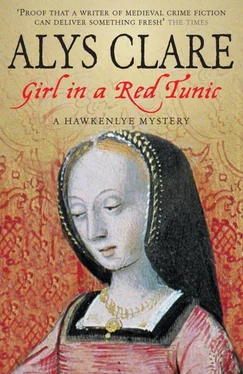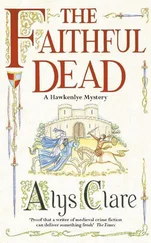Alys Clare - Girl In A Red Tunic
Здесь есть возможность читать онлайн «Alys Clare - Girl In A Red Tunic» весь текст электронной книги совершенно бесплатно (целиком полную версию без сокращений). В некоторых случаях можно слушать аудио, скачать через торрент в формате fb2 и присутствует краткое содержание. Год выпуска: 2006, Издательство: Hachette Littlehampton, Жанр: Исторический детектив, на английском языке. Описание произведения, (предисловие) а так же отзывы посетителей доступны на портале библиотеки ЛибКат.
- Название:Girl In A Red Tunic
- Автор:
- Издательство:Hachette Littlehampton
- Жанр:
- Год:2006
- ISBN:нет данных
- Рейтинг книги:5 / 5. Голосов: 1
-
Избранное:Добавить в избранное
- Отзывы:
-
Ваша оценка:
- 100
- 1
- 2
- 3
- 4
- 5
Girl In A Red Tunic: краткое содержание, описание и аннотация
Предлагаем к чтению аннотацию, описание, краткое содержание или предисловие (зависит от того, что написал сам автор книги «Girl In A Red Tunic»). Если вы не нашли необходимую информацию о книге — напишите в комментариях, мы постараемся отыскать её.
Girl In A Red Tunic — читать онлайн бесплатно полную книгу (весь текст) целиком
Ниже представлен текст книги, разбитый по страницам. Система сохранения места последней прочитанной страницы, позволяет с удобством читать онлайн бесплатно книгу «Girl In A Red Tunic», без необходимости каждый раз заново искать на чём Вы остановились. Поставьте закладку, и сможете в любой момент перейти на страницу, на которой закончили чтение.
Интервал:
Закладка:
Oh, had it only been Josse!
She was afraid. But I shall not show it, she resolved firmly; seizing the initiative, she said frostily, ‘You are not who you pretend to be. Why have you brought me here?’
He spun round and stared at her. He was slightly shorter than she was and she felt a moment’s pride at this small advantage. Not that it would do her any good, she realised, for he would no doubt prove the stronger if she tried to wrestle with him and make a break for freedom.
He did not answer her question. But, after a moment’s scrutiny, he said, ‘No, my lady Abbess, I am not a sheriff’s man. I serve nobody but myself.’
‘Who are you?’ she demanded.
‘You do not know?’ He looked amused. ‘You are an intelligent woman, I have been given to understand; I had thought that you might have guessed my identity.’
Swiftly she thought. Someone was threatening her son, someone who seemed to know that he was her son and who had sent a vicious man to Leofgar’s house to search for something that had not been found. This someone was presumably still desperate to finish what he had set out to do and must feel that taking captive the Abbess of Hawkenlye was in some way going to help … There was really only one person who this man could be.
‘You are Arthur Fitzurse,’ she said coldly.
He pulled off his dirty cloak, revealing an expensive-looking tunic whose braid, she noticed when the light briefly caught it, was actually of poor quality and beginning to fray. And now he has brought me to this — this place , she thought, which, even if not his home, must be the best that he can find to fill his need, lowly and foul though it is. This man, she thought, with what felt like a surprising stab of compassion, tries too hard to achieve his illusion of respectability, education and wealth.
She wondered why. She thought she could probably guess.
‘Please, my lady, be seated.’ He stepped forward and flicked at the surface of the narrow bench and she moved towards it and sat down as elegantly as she could manage, back straight and head held high, spreading her wide skirts gracefully around her.
He watched her closely for a moment. Then he said, ‘I would tell you a tale, my lady, if you have ears to hear it?’
He sounded as if he could only just control his eagerness. Feeling again that strange impulse of pity, she inclined her head and said, ‘You have employed deception to bring me here, from which discourtesy I deduce that your motive, whatever it may be, is of great importance to you. Very well, I will listen. What would you say to me?’
He watched her for a moment longer then, as if he needed to concentrate and the sight of her was a distraction, turned away and, staring out through the mean little door, began to speak.
‘I am the only child of my mother,’ he said, ‘and for much of my life believed my father to have been a soldier killed in battle before I was born. As young fatherless children are wont to do, particularly if they are imaginative and male, I formed a secret picture of this man. He became in my eyes a hero, an Achilles, a Lionheart, and I told myself tales of his exploits in the Crusades and before the gates of Troy. I saw him as very tall, broad of shoulder, deep of chest, with a noble face like a Greek god. He was honourable, brave, modest in victory and considerate of his enemies and, naturally, he never lost a battle in his life.’ Arthur smiled briefly. ‘You will appreciate how childish was the mind that made up this comforting story, for had my soldier father truly never lost a fight, how was it that he came to die before I was born? I revised my tale as I grew older and decided that he had died of a single and totally painless sword thrust through the heart while in the act of saving the lives of an entire company of his loyal men, and that they gave him a hero’s funeral out in some beautiful oasis where the soft wind sighed in the trees and a huge moon rose over a flat plain.’
He paused. Then, his voice tight, went on, ‘I took great comfort from these imaginary scenes, for in truth my childhood was wretched. What paltry wealth there was soon disappeared and the triple spectres of poverty, hunger and disease stalked me constantly. There was never enough to eat and we — I did not spend my youth as do other boys, for I was a solitary child and had no friends other than the creatures of the wild.’
Again he paused. Helewise burned to question him — who looked after him? Where did they live? Surely not here! — but she held back. Intuitively she knew that the telling of his story caused him pain and she was loath to interrupt and perhaps risk irrevocably halting the flow of words.
Presently he resumed his tale. ‘This is an unwholesome place, for it is permanently damp and the river seeps underground, turning firm green grass to a quagmire whenever there is rain; and rain, it seems, falls ever more frequently here than elsewhere. The mists creep about like living things and the very air is wet and foul, bringing phlegm to the throat and rheum to the chest. One’s bones ache, my lady, almost all the time. But this place has one advantage: nobody comes here unless they must. For certain, nobody but the outcast and the desperate would choose to live here.’ He sighed. ‘For those like me who are both, it is … convenient.’
‘Then this is indeed where you live?’ she whispered.
He turned to consider her. ‘It touches you, that this might be so?’ he asked.
‘I — it is an unwelcome thought to think of anyone making their home here,’ she replied guardedly.
He smiled faintly. ‘It is, isn’t it? Well then, my lady, be assured that I do not in fact live here; not all the time, at least, although it is, as I have implied, a most convenient place when one is concerned with matters of a clandestine nature.’ Again, she observed, that careful use of words and of grammatical constructions, as if he were very keen to demonstrate that he was — or was pretending to be — an educated man. ‘Which, of course,’ he was saying, ‘brings us to my purpose in bringing you here.’
‘It does,’ she agreed, ice in her voice.
‘Soon, my lady, soon,’ he soothed. ‘Let me first continue my story.’
She seemed to have no choice but to listen and so she gave him a curt nod of encouragement. Smiling again, he turned back to his contemplation of the dismal scene through the door and picked up the thread of his narrative.
‘The word that was most often used to describe my lot in life,’ he said slowly, ‘was unjust . I certainly employed it myself in my thoughts, for I was the son of a soldier, a hero, was I not? Did I not deserve better than to live in wretchedness on the very fringes of society? Yet there I was, dressed in rags, sleeping on mouldy straw, always hungry, frequently verm inous and usually dirty unless I saw to my cleanliness myself which, I might tell you, I began to do as soon as I was able.’ With what appeared to be an almost unconscious gesture he smoothed his tunic and ran a hand over his hair. ‘By making myself presentable, I was able, as I grew out of childhood, to find myself employment. Nothing much — never the sort of task for which I believed myself fitted — but at least I earned a little money and, by spending it wisely, steadily I improved my lot.’ He turned to look at her briefly, then said, ‘Not all of my dealings were strictly honest, my lady, for I burned with resentment and did not hesitate to take from those who had plenty. They were living the life that I should have had and I saw no reason why they should not donate to my cause, even though they might not know that was what they did.’
He is a thief, Helewise thought, although it would seem an honest one, for here he is confessing to me his past misdeeds.
Читать дальшеИнтервал:
Закладка:
Похожие книги на «Girl In A Red Tunic»
Представляем Вашему вниманию похожие книги на «Girl In A Red Tunic» списком для выбора. Мы отобрали схожую по названию и смыслу литературу в надежде предоставить читателям больше вариантов отыскать новые, интересные, ещё непрочитанные произведения.
Обсуждение, отзывы о книге «Girl In A Red Tunic» и просто собственные мнения читателей. Оставьте ваши комментарии, напишите, что Вы думаете о произведении, его смысле или главных героях. Укажите что конкретно понравилось, а что нет, и почему Вы так считаете.












